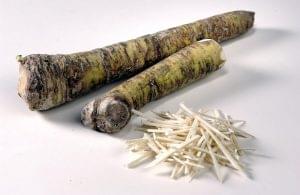Not only Hungarians eat domestic horseradish during the Easter holidays
As Easter approaches, the demand for various grated horseradish products increases dramatically every year. Hungary is the leader in the European Union in the production of this plant, known for its pungent taste. Most of the products available in stores come from domestic production, but Hungarian vegetables also reach Czech and British consumers.

(Photo: NAK)
Although various horseradish products are available on store shelves all year round, demand increases significantly in the weeks before Easter. Good news for lovers of Hungarian products is that most of the horseradish products available in supermarkets come from domestic production. Our country is also outstanding in horseradish production at a European level.
Horseradish is grown on nearly 1,250 hectares in Hungary, with an annual harvest of around 10-11 thousand tons
Thanks to the phased harvest and storage technology, the Hungarian crop is sufficient to serve not only the domestic market, but also more than half of the European market until the new horseradish is harvested. We export a significant part of the horseradish produced in our country. Hungarian horseradish is primarily sold on the markets of the United Kingdom and the Czech Republic, typically in fresh, unprocessed form.
Although most consumers during the Easter period look for the grated version, the food industry also likes to use it for pickled and vinegar-preserved preparations (cucumbers, cabbage, beets, mixed vegetables, peppers, horseradish sauce, etc.).
Horseradish is a native plant in our country, and its characteristically pungent taste is caused by the butylthiocyanate and allyl isothiocyanate in its roots. These compounds are very similar to the active ingredient in mustard oil, they affect the mucous membrane and the lacrimal glands; this is why tears come to our eyes when consumed, and it also strongly irritates our nose. Freshly grated horseradish is extremely healthy, high in vitamin C; it has a bactericidal and antiviral effect.
NAK
Related news
Festive table, new habits
🎧 Hallgasd a cikket: Lejátszás Szünet Folytatás Leállítás Nyelv: Auto…
Read more >Ham seasons: the bad, the better and the good (?)
🎧 Hallgasd a cikket: Lejátszás Szünet Folytatás Leállítás Nyelv: Auto…
Read more >Related news
Fidelity: What awaits China in the Year of the Horse?
🎧 Hallgasd a cikket: Lejátszás Szünet Folytatás Leállítás Nyelv: Auto…
Read more >









